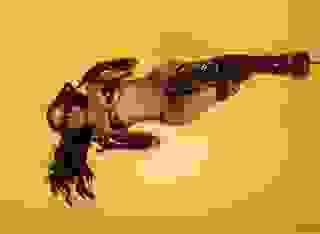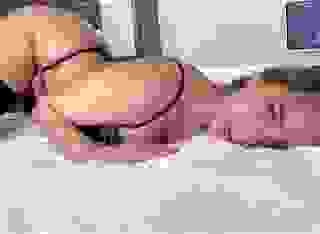Note: You can change font size, font face, and turn on dark mode by clicking the "A" icon tab in the Story Info Box.
You can temporarily switch back to a Classic Literotica® experience during our ongoing public Beta testing. Please consider leaving feedback on issues you experience or suggest improvements.
Click here"Really? What's he doing?"
"I think when I first heard from him he was unemployed, recently divorced for the second time and a little down and out. But from what I can tell, he's back on his feet now. Selling cars, I think. But he's always been kind of a ne'er do well kind of guy."
We lay there in comfortable silence for a while.
"I think about you putting him in his place often," Sydney said.
"I think about it every so often as well," I said. "I still can't believe that I did that. It's so out of character for me."
Sydney lifted her head and looked at me, quizzically.
"I think it was totally in character for you," she said. "You reacted out of a need to protect the girl you loved. I can't tell you how much that meant to me." She put her head on my chest and continued. "You know my Dad never did that for me. If I was being bullied at school -- and trust me there was lots of that in the Bronx -- all he'd do is give me some lame ass lecture on standing up for myself. Like I could against four or five street-tough girls. And Richard? We'd go out to a bar and some obnoxious drunk would start hitting on me and getting all handsy and he'd just laugh. He thought it was funny watching me fend them off. All he would have needed to do was stand up and tell them to get lost and they'd be gone. You took a big risk standing up for me. I knew then -- I think I always knew actually -- that you were really special. I was just too afraid to stand up to my father and go after you. I regret that so much now."
I kissed the top of her head.
"I think we need to agree that we can't live the rest of our lives regretting that we didn't spend more of it together. To the extent that we do that, we diminish our happiness in the here and now." I squeezed her even tighter. "And I for one am supremely happy in the here and now."
Another big smile. "Me, too."
On Friday morning, Sydney and I both had early meetings -- me with my editor and Sydney at the National Endowment for the Humanities. We realized quickly that my little bachelor pad bathroom would never work for both of us. If this was going to be a regular thing -- and I certainly hoped it would be -- I needed to either renovate or move.
My meeting that morning was with my reporting team at the Post. There were four of us altogether working on the Cameron/National Health Insurance Act story -- me, my editorial assistant Kevin, a junior government reporter named Henry and the Post's primary health reporter, a tiny Asian woman named Cindy.
While technically we were a team of equals, none of them had an office with four framed Pulitzer Prizes medals on the walls, so we met in my office and generally, I offloaded some of the more mundane tasks to them to research and report. The exception in that regard was Cindy, who was one of the brightest and most productive journalists I'd ever worked with, who needed no direction from me. She came to this meeting more as a matter of coordination.
I wrapped up the meeting by summarizing what we'd agreed to.
"Kevin, you're going to get to work on FOIA requests for all the security video from the HHS HQ. Run those by me before you send them in. Oh, and FOIA the visitor logs from Thursday through Sunday of that week." FOIA is the Federal Freedom of Information Act, one tool in the reporter's toolbox. As a mentor of mine told me years ago, FOIA was a great tool for getting documents, but not a great tool for making deadlines.
"Henry, you're going to report on what's happening on the Hill, right? The Senate Judiciary Committee is rumbling about holding hearings to quiz the FBI on their progress or lack thereof.
"And Cindy, you're going to look into how the murder and subsequent investigation is impacting implementation of the NHIA?"
"Yes. Cameron held so much of the process close, that now no one really knows everything that's going on and it's holding up a bunch of key decisions."
"Okay. And I'm going to keep pushing on the law enforcement side. I want to find out if the FBI has interviewed Beckwith and if not, why not? I'm a little concerned that they might be showing him deference because they perceive him as rich and powerful, which is just so much bullshit."
"Will they tell you that?" asked Henry, a little naively.
"Well, no, not directly. But I'll find out. It's just like it is here: if they're being deferential, it's because someone up the food chain has told them to be, and that means that the agents are pissed about it. Someone will talk."
As the meeting broke up and people started to filter out of my office, Cindy lingered, making small talk. When we were alone she came around behind my desk and perched on the edge of it. Cindy and I dated once, but we soon figured out that we probably weren't a good match. We remained close, however, and I loved her as a dear friend.
"So the newsroom is agog. Apparently you were spotted outside the building this morning kissing a gorgeous black woman."
I didn't deny it. I just sat there with a smirk on my face.
"Okay. Fess up. Who is she?" Cindy asked, playfully.
"Her name is Sydney Thomas," I said. "She's an old college friend. We recently reconnected after about 30 years."
"You look really happy," she said.
"I am. Happiest I've been in years."
"I'm really glad, Stephen. You deserve to be happy."
"Thanks Cin," I said. "She's coming up to the newsroom at noon to pick me up for lunch. I'd love to introduce her to you."
"If I'm around, I'll look in around 12"
About 11:45, Cindy stuck her head in my office again.
"Is she the Sydney Thomas who's at MOMA?" she asked.
"Yup."
"Damn. She's a legend," she said. Then she flashed me a big grin. "But then so are you. So she's met her match."
Just then a security guard called me from the front desk to tell me that some lady named Sydney was here to see me.
"Bring her up, please."
A minute later Sydney walked in and I walked around my desk to give her a hug.
"Sydney, I'd like to introduce you to one of my closest friends. This is Cindy Park."
They exchanged pleasantries, then Cindy made an excuse about getting back to work and left.
"So, let me guess. An old girlfriend?"
I laughed. "What makes you say that?"
"She's gorgeous. I can see you two together. And you two kinda give off a vibe. Should I be worried?"
"Not in the least. We dated for a couple of months, back before the pandemic. It didn't work, but we're still pretty close."
We went to lunch at a restaurant nearby and were having a nice, relaxing lunch. Sydney told me all about her meetings at the National Endowment for the Humanities, which was an important MOMA funder and where she had some lifelong relationships.
Then my phone rang. I looked at the screen and told Sydney I needed to answer it.
"Stephen Bradley."
"Good afternoon Stephen. This is Neil Crawford."
No need for the President's Chief of Staff to explain to anyone who he was.
"Oh, hi Chief. How are you?"
"I'm good. Listen, the President asked me to call you. I need to have a conversation with you on background. Are you free to come to my office this afternoon? Say three P.M.?"
It really didn't matter if I was free. If I wasn't, I'd have to rearrange my schedule. You don't turn down an opportunity to speak to the President's Chief of Staff.
"Of course. That works for me."
"Thank you. See you then."
"I wonder what that's about?" I said to Sydney. "Richardson's Chief of Staff wants me to come in for a one-on-one."
"Is that unusual?"
"More than you know. In some administrations the chief is the leaker-in-chief. But not Crawford. He's notoriously taciturn. Has relatively little to do with the press. Is rarely quoted. He's Richardson's right-hand man though. It's said the President doesn't make a move without consulting him.
We finished our lunch and Sydney went back to the NEH for another meeting and I went back to the Post. We agreed to meet at my place after work.
Back at the paper, I went into the newsroom to talk to Cindy and found her on the phone. She gestured that she'd come find me in 5 minutes.
Good to her word, she came into my office a few minutes later, and I asked her to close the door.
"So I need you to run this afternoon's meeting and fill me in on what was said."
"Okay. Hot liaison with Sydney?" she joked.
"I wish. Neil Crawford wants me to come in for a chat."
"Crawford? Really?" Cindy asked. "Not really one of our go-to sources."
"Yeah. In three years, I think I've quoted him once."
"What's he want?"
"He didn't say. Oh, I know I don't need to tell you this but don't tell the kids who I'm meeting with."
She grinned. "The kids?"
"You know what I mean." I said. "At this point in my life, anyone under 30 is a kid."
She laughed. "Well I'm glad I have enough gray to no longer be considered a child."
"You don't have a single gray hair and you know it. You know what Sydney said, the minute you were out of earshot this afternoon?"
She shook her head.
"She says, 'Old girlfriend?'"
Cindy raised her eyebrows a millimeter. "How'd she know that? I was completely professional."
"She says we give off this vibe when we're together."
"Hmmph. I'll have to watch that. You two are cute together, by the way."
I laughed. "That what her daughter said."
"You've met the kids? Jesus, you're in deep Bradley. Kinda not your rep."
"Oh yeah? What's my rep?"
Cindy, who was on her feet, came up to me and tugged on my necktie.
"Your rep is that you're a love 'em and leave 'em kind of guy. You know, like you did with me." She was now grinning, ear to ear.
"Don't pretend that wasn't mutual, Miss Cindy Lou Who." That was my pet name for her when we were together. I imagined her a lot like the Seuss character, pestering her sources.
"Oh, I know that. But the kids don't know that. I didn't want to spoil the legend." She laughed and left me standing there, grinning a little myself.
If you didn't already know it, you would assume by looking at him that Neil Crawford was, at best, some kind of Washington functionary. He was short, gray and balding, with thick tortoise shell glasses he had to push back up his nose every few minutes.
But despite his appearance, it was well-known that he had great influence with Richardson.
I was escorted by a press aide to Crawford's office and sat in a chair in the hallway for just a minute before he came to get me.
"Come on in, Mr. Bradley."
We shook hands and he had me sit at the huge conference table that dominated his office.
"Coffee?"
"If you're having some."
He stuck his head out the door and spoke to his assistant and returned to sit opposite me.
"The boss thinks very highly of you."
That was a trap. He was trying to get me to say something positive about Richardson even though he knew only too well that I didn't really give a shit what Richardson thought of me.
"Thank you."
The assistant came in with two coffee cups on a silver tray, and served one to me and one to her boss. When the door closed, Crawford began.
"This conversation is on background, right?"
"That's my understanding."
"And to be clear, in this context, that means you can quote me without using my name or title, using instead something like a "High Administration Official" or "officials at the highest levels of the Richardson Administration."
"Agreed."
"Okay. So this is the story. The administration is seriously unhappy with the pace of the investigation of Secretary Cameron's murder. So much so, in fact, that the president is meeting with the Attorney General and the FBI director as we speak to make it clear to him and the FBI that failure in this investigation is not an option."
"Okay. But what if they do fail? I understand that the investigation is pretty much stalled."
"I think it's fair to say that personnel changes will be necessary if this goes any longer without some resolution. "
"I know the President to be a pretty plain speaker. Is he telling the FBI Director and the Attorney General right now that they'll lose their jobs if they don't make an arrest?"
"It's my understanding that he is making the situation clear to them. He's offering them more resources. He's urging them to deploy more staff. " He paused and stood, pacing in front of the floor to ceiling windows in his office, occasionally stopping to look out.
"The rest of this has to be on deep background, and cannot run concurrently with what I've said thus far. I don't want anyone to assume that it came from me because it's in the same story. "
"Fair enough. Separate story. I can't guarantee a separate day."
He chewed on this for a while.
"Very well." He sat back down and leaned across the table towards me. "Everyone from the President to the guy out there sweeping the sidewalk suspects that Jerome Beckwith is behind this murder. No one is silly enough to think that Beckwith hung around all weekend in the men's room waiting to shoot him. But he hired the person who did, or at least knows who hired him. But as of 1 p.m. this afternoon, the FBI had not interviewed him. Why I ask you? What the hell are they afraid of? Why don't they have him in a room with their very best interrogator giving him the third degree? I tell you it is unfathomable."
Crawford was really worked up. His legendary calm had disappeared and he was slightly red in the face, pacing again up and down the same stretch of carpet.
"He should have been put under a microscope long before now. He should have been named a 'person of interest' to get the weak-kneed around him to realize they need to start talking to save themselves. Now I'm not the vaunted FBI, but even I know this shit."
He paced some more. "Damn it Bradley, everything the boss has accomplished in the last two years will amount to shit if we go into next year's election with this case still unresolved. Have you looked at the internet? Some people are openly speculating that it was the President who put the hit on Cameron. In this day and age, a conspiracy theory like that can sink you in the primaries with all the wack-a-doodles in this party."
"So, I ask you, Bradley. Why are they leaving him alone. What does he have on them? I want you to ask those questions."
When Crawford was done with me, I almost ran out of the building, bringing up my cell phone and calling my editors. I needed to reach them before they went into their daily news budget meeting.
"Bradley, Park said you were hot on some new lead. What've you got?
"I haven't got it in headline form yet but suffice it to say that the FBI Director and Attorney General were called on the carpet today and Richardson told them to solve this case or pack their bags."
"Really? Holy Shit. Can you get this by seven? I'd like it to lead the early edition."
"Sure. On my way back to the newsroom now."
Richardson Administration Pressures FBI, Justice for Progress on Cameron Murder
The Attorney General and the Director of the FBI were summoned to the White House today for what aides said was a "dressing down" by President Richardson over their lack of progress in tracking the killer of former HHS Secretary Rodney Cameron.
Sources at the highest level of the Richardson administration told the Washington Post today that Richardson made it clear to FBI Director James Sutton and Attorney General Armstrong W. Madden that the pair's jobs were on the line, should they fail to make an arrest and successfully prosecute Cameron's murderer. These sources spoke with the agreement they would not be named so they could speak candidly about internal administration discussions.
Top aides to the President confirmed this afternoon that the meeting, held in the oval office at 3 p.m. was tense with Richardson at times shouting at the Attorney General and FBI Director. Key to the administration's ire is the failure to identify any suspects or even interview some possible persons of interest.
Facing a reelection campaign that begins a few short months from now, the administration is concerned that the murder investigation -- and their lack of progress -- will eclipse their accomplishments and make renomination and reelection less li
Spokespeople for the Department of Justice and the FBI have not returned repeated phone calls seeking comment.
The late Mr. Cameron had himself been fired by Richardson after it was revealed in a book detailing the letting of contracts for the National Health Insurance Act may have been rigged in favor of Mr. Cameron's long-time friend Jerome Beckwith.
That book, "Plunder" has remained at the top of the New York Times' non fiction best seller list now for 14 weeks.
As soon as I had returned to the newsroom, I huddled with Managing Editor Paul Goodhue to talk about the second story on my agenda for the day. I laid out the issue for him.
"So a source at the highest level of administration told me today that the administration is furious that the FBI haven't interviewed Jerome Beckwith -- said flat out that Beckwith should be interrogated and named a 'person of interest' in the investigation," I said. "I need to do more work to flesh it out and confirm it, though I don't doubt it's true. I might not be able to line it all up by deadline, but that's a dynamite story."
"Dynamite, yes. My fear is that particular piece of dynamite could blow up in our faces. We need to get the lawyers involved in this," the editor said. "Can you tell me who your source is?"
"If I do, it can't go any further."
"Is it Richardson again?"
"No. You won't tell anyone? Even the lawyers?"
"Okay."
"It's Neil Crawford. I met with him for more than an hour this afternoon."
"Well, no one would ever accuse him of running off at the mouth. They must be pretty pissed if he gives you an hour."
"They are. And look at it: Who stands to gain more than Beckwith by Cameron's death? Now there's no one for the FBI to pressure over the whole bid rigging mess. With Cameron gone, that's going to be a tough case to prove."
"Yeah, but no one is more lawsuit happy than Beckwith. And we have to ask whether the lawyers think that Beckwith would qualify as a public official. If not, there's no way we can print this."
In the New York Times vs. Sullivan, the Supreme Court carved out an exception to libel law requiring a public official to prove the media acted with "actual malice" before a finding of libel. But if the person libeled was not a public official, there was no "actual malice" standard. And there's no question that accusing someone -- even obliquely -- of murdering a cabinet member would be seen as libel if we couldn't prove that it was true. So this was a tricky issue.
"Okay," Paul said. "I'll get the lawyers in here. Write the story. Try to finesse it a little so we're not accusing him. Then we can get the lawyers to look at it."
I wrote a draft of the second story, sent it to the managing editor and then texted Sydney that I was on my way home, bone-weary after a hellacious day. She told me she'd order takeout and it should be there by the time I got home.
I was musing about this change of events. It had been years since anyone cared when, or ever whether I got home. As my Uber pulled up in front of my apartment, I could see the lights were on and I could see the figure of Sydney moving around in the brightly lit home. This was a new but welcome addition to my life and I was savoring it as I climbed out of the Uber onto the sidewalk. That's when I saw the man approaching me whom I assumed was the takeout delivery person. He had a package under one arm, which puzzled me for a moment because it seemed to be the wrong size
"Is that for me?" I asked walking toward him. Out of the corner of my eye, I saw the Ring doorbell camera light up as it detected my movements.
"Yes, sir, this is for you."








